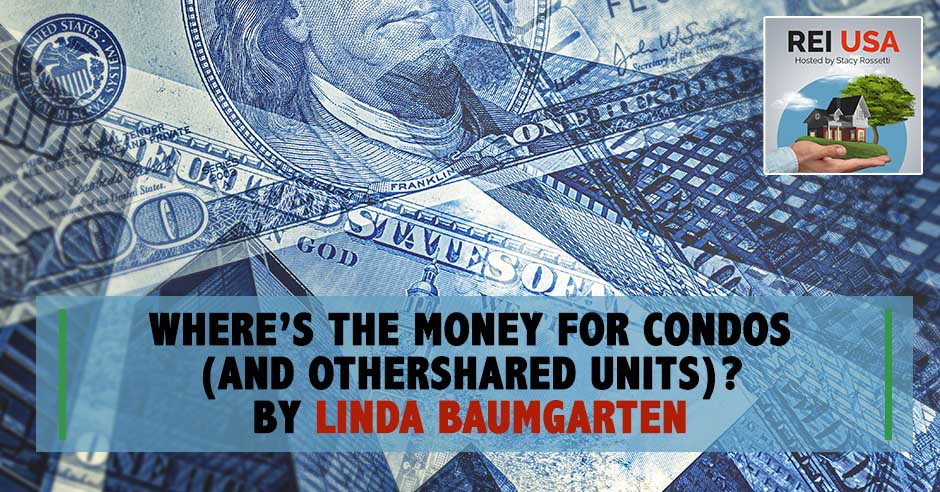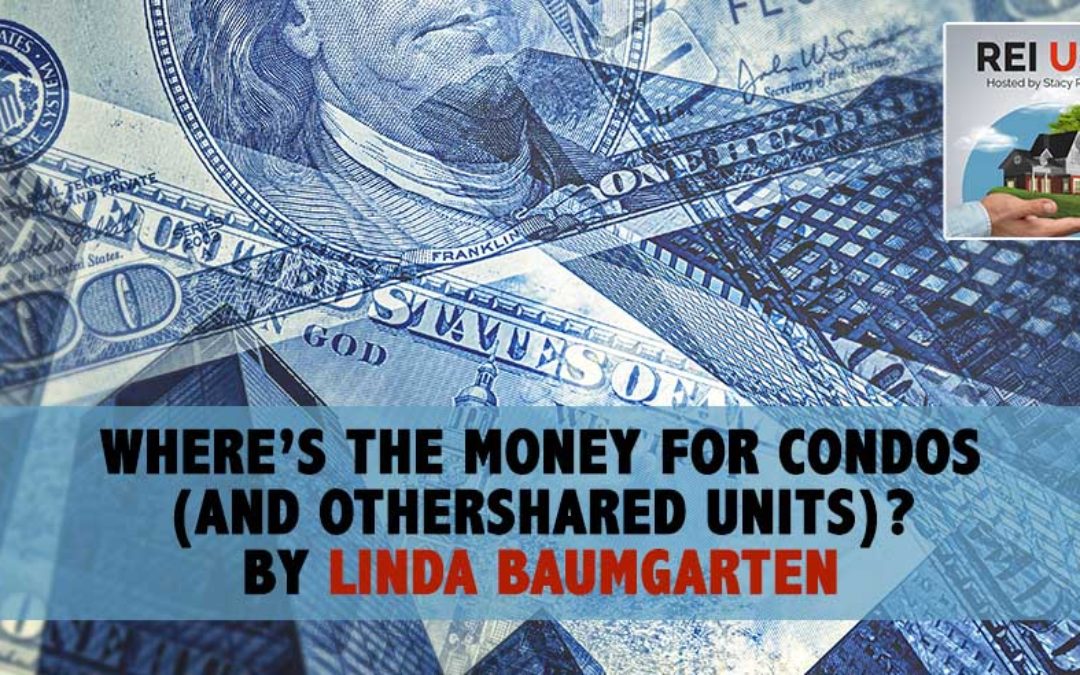
You’re going to need money for real estate, but it doesn’t have to be your own money. So how do you go about buying properties using none of your own money? Today, Linda Baumgarten talks about creative financing and getting the money to buy condominiums. She also takes a deep dive into why traditional mortgages may be your best friend, some little-known mortgages you have never heard of, and alternative/creative methods that really work.
—
Watch the episode here
Listen to the podcast here
Where’s The Money For Condos (And Other Shared Units)? By Linda Baumgarten
Linda, how are you?
I’m good.
What you’ve been up to?
I’ve written a couple of books myself. I understand the process. We’re in the middle of funding single families in Albany, Georgia. I’m running around doing all the less fun things for that.
You can go ahead and start. Linda teaches on condos. That’s her specialty, and she is going to come and teach for REI USA. Be on the lookout for her too.
I’ve done all kinds of real estate, but since nobody talks about investing in condos and co-ops, I’ve taken that on. If you want to call me the Condo Queen, feel free to do so. I’m going to talk about where’s the money for buying a condominium. Let’s assume that you want to, and this is going to be talking about this.
There’s an interesting case study in New York where there was an investor bought an apartment building. He thought he could make a quick buck, but good for him, but there was enough resistance that somehow the people living there objected, and they are now buying the whole building as a co-op. It’s being funded not through public funds but through a not-for-profit. They’re taking ownership as a cooperative for this building. That’s another avenue that we don’t talk about too much with co-ops, but I thought that was interesting. The owners are now financing their own building, and somebody else made it happen.
I’m going to talk about where’s the money to buy primarily condominiums, but also any of these shared projects and any type of real estate, for the most part. I’m going to cover these subjects here as quickly as I can, as my company is ordinary to extraordinary publishing because I believe that ordinary people are extraordinary. These are some disclaimers that you should know about. That’s the CYA stuff.

Buying Condominiums: Prices are going up. This is an opportunity for a buyer to lock in at a price and not have to worry that they will have to pay a lot more in the future.
A little bit about me real quick. I’ve done all kinds of real estate since the ‘80s, pretty much. I sold health insurance for a long time, and that was important because I learned how to market and sell. I also learned the value of residual income. I was known as Kiyosaki of Waterbury, Connecticut, back in the day.
I did start the Connecticut Real Estate Investors Association. It became the largest REIA and coaching program in the Northeast USA. Since then, I’ve handed that off to a new team of people that are doing well. I have written two books there on Amazon. I have written a couple of online courses, and I’ve been featured in a lot of different articles. That means that you’re supposed to listen to me. I hope so.
I’m going to cover a couple of different topics, first of all, how to buy houses using none of your own money, which is my favorite way of doing it. Here’s the definition of creative financing. I want you to get into this idea that you only have $100 to buy a house and your credit score is a disaster like in the 400s, and you don’t have a job. Let’s think about that because, as George mentioned, at some point in time, “You’re going to need money for real estate, but it doesn’t have to be your own money.”
The whole point of creative financing is that it uses money from different sources. It is creating win-win transactions with both you and the seller and also your tenants but leveraging off the value and equity of the property rather than using cash and exploring options that most consumers are not aware of. Primarily our best deals come from people that are facing some challenges. Our job as real estate investors is to come up with a solution that will allow them to sleep at night and move on with their lives.
Creative financing is not relying on traditional financing. I am going to share some of those. It’s not scamming people out of money or their real estate. It’s not scheming to get rich quickly. You can make quite a lot of money in real estate, and it’s not necessarily going to happen overnight. Sometimes it does. Sometimes it doesn’t.
The nice thing about owner financing is that you can negotiate directly with the seller. It doesn’t have to be listed if it’s not listed with a real estate agent. You can still deal directly with the seller. You need to make the agent aware that that’s what you’re doing. You don’t need any money out of your own pocket. They don’t check your credit for the most part. You can buy the property as-is. The seller doesn’t have to make any repairs. You don’t have to get approval from anybody, and you don’t have to get appraisals from anybody, which is valuable, especially now, where there’s a changing market and things are going out quickly.
There may be an adjustment. We don’t know, but at least this way, we can use our own noggins to figure out the best thing to do. You can close the sale quickly, and you can create like the one we’re doing now. We put it under contract, and we’re closing in 9 or 10 days, just enough time to get the title search. You can create very flexible terms.
The other thing about owner financing is that interest rates could be as low as you want or as high as you want. It depends on who’s negotiating and aiding on what. There are all these other things that you can do right here. You can make money on the monthly payments. You can make money on the interest rate spread. You can create no qualifying financing for future buyers, and you could even discount the note when you want to cash out the seller.
[bctt tweet=”The whole point of creative financing is that it uses money from different sources, creating win-win transactions with you, the seller, and your tenants.” username=””]
What that means is you come up with an agreement that you’re going to pay the seller for the next ten years. Three years in, the seller needs the money now. You can renegotiate that note and say, “I’ll pay you off now, but I want a further discount on the price because he wants his money now, instead of waiting the time we negotiated, which is ten years.”
Lease options are a particular type of creative financing or owner financing. There are two documents going on. There’s a lease like a regular rental lease, and there’s an option to purchase. They are locked in together with each other, but they are two separate documents. Do these with an attorney, especially the first time around, because those things change state to state.
Prices are going up. We don’t know for how much longer, but they’re going up. This is an opportunity for a buyer to lock in at this price and not have to worry that he’s going to have to pay a lot more in the future. On the other hand, when the market is going down, it’s a great way for the seller to lock in this high price now. He or she is going to get that amount of money even as the price of the property goes down. It works that way.
It gives you an opportunity to lease it, and you have an option to purchase it. This means you’re not required to buy it. It gives you an opportunity to test drive the house, the neighborhood, and the schools. A lot of people will use this as an option if they want to develop the land. It gives them time to put an option on a piece of land, go get all the approvals, and the permits are done, assuming all goes well, and they can go ahead and buy the property. If it doesn’t work out, no harm, no foul, except for the option for you that you put in.
In the meantime, let’s say you were in a situation where you’ve not been able to sell the property for whatever reason. This allows you to collect payments. The person that is renting it now thinks that they own it, so they will take much better care of the property. It allows you to move on with your life. This is a great strategy.
There are a lot of different ones. Here’s a little quick chart on it. With a little or no money down, you don’t have to get your credit checked. You’re putting down an option payment of a small amount. For rent payments, I recommend that if you are selling this on a lease option, you make sure that payments equal the seller’s mortgage payment, their PITI, principal, interest, taxes, and insurance. When they refinance several from now, they can show to the mortgage company, “I’ve been making these payments.” They feel warm on you plus you’re back giving them a mortgage. That’s an important thing.
You can buy the property with large equity or no equity at all. Equity builds up over time for the most part. There are three different ways to profit from this. One is the option payment is nonrefundable. You get that option payment upfront. You make money from the monthly rent payments from the tenant or whatever the cashflow is. You also get a backend profit when the buyer buys the property and place you off.
If they don’t, if they cannot execute the option, and if they cannot close the deal, you could repeat the process. We try to work with people as much as possible on that. My other favorite way is private notes, which is money that’s borrowed from an individual’s bank account, retirement account, self-directed IRA, 401(k), or any of these things. This is money that people happen to have.

Buying Condominiums: When you’re doing hard money, they want points upfront. That’s how they make money. When you’re borrowing from a private person, you don’t have to do that, and the loan could be as short as six months or as long as several years.
Some people borrow against their stock account up to a certain amount. Some companies allow you to do that. You can leave the stock in place, but you’re borrowing against the value of your portfolio. I’m sure many people have talked about you want to make sure you’re only in 70% loan to value because you want to leave that cushion in case the value does change.
Interest rates could be anything, whatever you want to set up. You can set this up with no monthly payments, especially on rehab loans. I try to structure them where I don’t make any monthly payments for at least six months. It gives me an opportunity to rehab the property, put a new tenant in there, or refinance the property, whatever it is, but you can structure it that way.
Usually, you don’t need any points. When you’re doing hard money, they want points upfront. That’s how they make some money. When you’re borrowing from a private person, you don’t have to do that. I hardly ever pay points. The loan could be as short as six months. It could be as long as whatever. Usually, it is several years.
There are closing fees, of course. You’re hiring an attorney, getting a title search, getting title insurance, getting insurance on it, all those things that you are used to. You’re going to pay with hard money. The benefits and such is you could have several loans at a time. Sometimes based on mortgage practices, they may only allow you to have a certain number of loans out. With private loans, it doesn’t matter. You can do as many as you want to as long as they agree to it. You could also borrow money as a second mortgage for the repairs or the back payments.
When I was creating the course on buying condos, co-ops, and more, I found out that there were a lot of ABCs and verbology words associated with mortgages. After several years of being in the business, I still didn’t know what all those initials meant. As part of the course that I’ve written for you is that I’ve put it together so you can look up what all those initials mean. FHA, Freddie Mac, Fannie Mae, and a lot of other agencies offer financing. What are their terms? How do you apply for them? What’s the best way to put yourself forward so that you can get qualified for it? It was a real education for me and for you too.
Condominiums are like any other piece of property. You own the unit itself. You own a percentage of the land, so you are a land owner, which is great. It’s different than a co-op, which I don’t want to get into now because it’s different. In condominiums, you can do anything you want, like with any piece of real estate.
Financing did get easier a couple of years ago when they said we could do a loan on an individual unit even if the condo complex has not been approved for FHA. That has opened up the doors. If your complex is approved through FHA, and that’s the link there, you bet it makes everything easier. You know that they follow the rules of FHA. You know that they have enough reserves to maintain the property. You know that there are at least 50% owner-occupied. If it is FHA approved, it’s a lot stronger community than if it’s not.
The community going to be in may not be approved simply because they didn’t do the paperwork. How often do you have to get the community approved? I think it used to be every two years. Now it’s every three years, which makes life easier for the condo association. If you go to this link, you can look up your community and see if it’s been approved. If it hasn’t been approved, don’t panic, you can reach out to them to see what the story is.
[bctt tweet=”You can make quite a lot of money in real estate, but it does not necessarily happen overnight.” username=””]
FHA is now closing loans on an individual basis, depending on certain items. The Veterans Affairs also offers loans. Their big difference with VA is that the community must allow rentals, which I found to be interesting. If you think about it, a soldier may be called into duty quickly, and they may not have time to sell the property. They want to be able to rent it. I thought that was an interesting nuance, but they have their own lists. There are other things like the United States Department of Agriculture and Indian housing. There are lots of different programs out there you want to be aware of.
Finally, IRA investing. If you have your own self-directed IRA, whether it’s an IRA, Roth IRA, 401(k), or any of these kinds of situations, as long as it’s self-directed, you can buy real estate within it or lend on real estate within that. The nice thing about it is you get the same tax advantages, tax-deferred, or tax-free, based on the type.
I try to borrow money from people who have money there because I know they don’t need it for a while. I want to run through a couple of deals to show you how we did this. This is my first investing deal. I bought this as a condo for $29,000. I got a line of credit if you lock for my own home. No money out of my pocket. I turned around and I rented it. I sold it for $55,000 about eighteen months later.
During that eighteen months, I made $5,400 in cashflow. I also make a $36,000 profit on the sale. I had a tax write-off for eighteen months because when you’re buying and holding, you get to depreciate the building over several years. I made some tax write-offs there. As an interest, I did hold a second mortgage for the buyer, and it was all done legally with the attorney. I was able to do owner financing myself for that person and I made a little bit more interest in that. That’s another avenue. I wrote it up with the attorney that did that.
Wholesaling is another way to “finance” real estate, like any other wholesale project. This is one example. The wholesale, I put it on a contract for $45,000. I found cash buyers in the area and assigned it for $55,000. I gave 30% to the agent that found the buyer. This is a way to finance something and make some money on it.
There’s another one that was pretty unique with these condos. With condominiums and co-ops, you have monthly fees that you have to pay. Some condos are quick to foreclose, and some of them are not. In this case, it was 55 and older. This gentleman owned three units. He never pays the HOA fees and the property taxes. He only collected the rent.
He tried to sell it. This buyer convinced him that he was not going to get any money out of it. He already did. She made a deal with the HOA and with the city to pay those taxes and HOA fees over time. For the first three years or so, she wasn’t making any money, but she didn’t need to, but now it’s owned free and clear except for the monthly taxes and HOA fees. She worked that out. It is a good negotiation because that’s not always possible.
There’s another way. We bought a condominium with private money from someone who had a self-directed IRA. We borrowed it from her IRA. We used a line of credit from the credit card companies to rehab it. There was no cash out of my pocket until we did it. Once we put it on the market, we sold it quickly in ten days. Private money and credit cards, don’t forget about those.

Buying Condominiums: You can do anything you want with condominiums, just like any piece of real estate.
The one thing about credit cards is those checks that you get in the mail. Realize that if you’re using them, it will affect your credit score because it affects your credit score when you use up your line of credit. Keep track of that and understand that if you get a commercial credit card, it will not show up on your personal credit. If you can get those, those are great anyway.
Here’s another example of someone working full-time. This needed hardly any work, and she bought this using her own IRA. When you use your own IRA, you cannot work on it yourself. You have to hire other people to do it. All the money goes back into the IRA. The bills that need to get paid by the IRA. You have to make sure that’s all clear. She was able to do that one.
Here’s another one, owner financing. The thing about condominiums is, like with any other real estate, somebody may or may not be able to sell the property when they want to. Let’s say somebody gets married, for example. They want to go combine households, and now they have this one. They don’t want to be a landlord.
This gentleman had the opportunity to buy four of them at the time. You’ll find that within one condo complex, somebody will own 4%, 10%, 50% of them, or even 100% of them. That opens up some other opportunities too. On this one, he bought it, and he put down $7,000. He got owner financing for the rest that only 4% interest. It was amortized over 30 years, but he had to pay it off in full in three and a half years.
What that means is you take a mortgage calculator, and you put in $30,000 at 4% for 30 years, those are your monthly payments. That’s not going to be paid off in three and a half years because you have 30 years to pay it off. In this case, there’s a balloon payment. You do need to be prepared in that three-and-a-half-year balloon to refinance, sell or find another private lender. He was able to cashflow $350 a month cash on a cash return of over 50%. That’s the structure of that owner financing.
There’s a project I did. It’s a condo complex. I got into this without using any of my own money. I bought this for $46,000. I left the debt in place and took over payments. I only used a couple of thousand dollars for minor repairs, and I rented it quickly. It cashflowed $550 a month. It has doubled in value. Since then, I refinanced another building. I used it to pay off the seller. Now, I own this free and clear.
The nice thing about condos is you can use any strategy you want to. We have a luxury rehab that we’ve done. This was all done with private money. We borrowed from a veterinarian, podiatrist, and another real estate investor, different things like that. It’s a mortgage and a note. Put it on the property anywhere from six months to a year.
I think that’s it. I crammed it all in. I didn’t time myself, but I got it in. If you want any more information about how to buy condominiums and how to make profits with them, that website you can visit. I do have a couple of books on Amazon if you’d like to do that. It says, “Women are better at real estate investing, but lots of men read my books also.” I am going to be running a condo investing workshop for REI USA, probably starting in July to August 2022, that timeframe. Stacy, are there any questions that I can answer?
Linda is going to start teaching for REI USA. Be on the lookout for that. I love this concept because my goal is to own vacation homes around the country. Instead of us living in an RV, we go to our condo. I like a condo because they didn’t have to do anything. You go there, and it’s there.
Important Links
- Linda Baumgarten
- Amazon – Linda Baumgarten
- Connecticut Real Estate Investors Association
- Condominiums – HUD
- www.REI-USA.com
About Linda Baumgarten
 Linda Baumgarten is the co-founder of CTREIA, the largest real estate
Linda Baumgarten is the co-founder of CTREIA, the largest real estate

